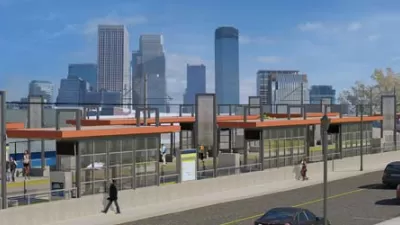In a familiar refrain for anyone who's lamented the veto power of NIMBYs or the added cost of citizen engagement events, one writer expresses concerned about a recent succession of developments shot down by community groups in the Twin Cities.
Marlys Harris is concerned about a number of proposed projects that have come under fire, and were subsequently killed or indefinitely delayed, by neighborhood groups in the Minneapolis area. The "mother of all" projects to recently suffer the ire of neighborhood groups, according to Harris, is the Southwest LRT. Says Harris: "The objections of local groups both in Minneapolis and St. Louis Park to various aspects of the route have forced the Met Council into proposing a fix that would raise the cost of the line by about $140 million to $150 million. Even so, they are unappeased, and a major piece of the region’s future transportation network is now teetering on the edge of a cliff."
Harris then goes on to provide a primer on "advocacy planning" as espoused by Paul Davidoff, who founded the urban affairs program at Hunter College in New York City (and which Harris attended) by discussing the defeat of the South Richmond Plan, which called for the massive redevelopment of Staten Island, at the hands of neighborhood advocates.
The lesson Harris learned at the time, and is sharing with Minneapolis at this moment: "So much for the wisdom of local interests. For a brief moment, they had an opportunity to shape a plan that could have provided continuing vitality to their neighborhoods, the city and the entire region. But they let it drop, and they're now paying a steep price."
FULL STORY: Citizen participation: blessing turned curse?

Study: Maui’s Plan to Convert Vacation Rentals to Long-Term Housing Could Cause Nearly $1 Billion Economic Loss
The plan would reduce visitor accommodation by 25,% resulting in 1,900 jobs lost.

North Texas Transit Leaders Tout Benefits of TOD for Growing Region
At a summit focused on transit-oriented development, policymakers discussed how North Texas’ expanded light rail system can serve as a tool for economic growth.

Using Old Oil and Gas Wells for Green Energy Storage
Penn State researchers have found that repurposing abandoned oil and gas wells for geothermal-assisted compressed-air energy storage can boost efficiency, reduce environmental risks, and support clean energy and job transitions.

Santa Barbara Could Build Housing on County Land
County supervisors moved forward a proposal to build workforce housing on two county-owned parcels.

San Mateo Formally Opposes Freeway Project
The city council will send a letter to Caltrans urging the agency to reconsider a plan to expand the 101 through the city of San Mateo.

A Bronx Community Fights to Have its Voice Heard
After organizing and giving input for decades, the community around the Kingsbridge Armory might actually see it redeveloped — and they want to continue to have a say in how it goes.
Urban Design for Planners 1: Software Tools
This six-course series explores essential urban design concepts using open source software and equips planners with the tools they need to participate fully in the urban design process.
Planning for Universal Design
Learn the tools for implementing Universal Design in planning regulations.
Ascent Environmental
Borough of Carlisle
Institute for Housing and Urban Development Studies (IHS)
City of Grandview
Harvard GSD Executive Education
Toledo-Lucas County Plan Commissions
Salt Lake City
NYU Wagner Graduate School of Public Service




























